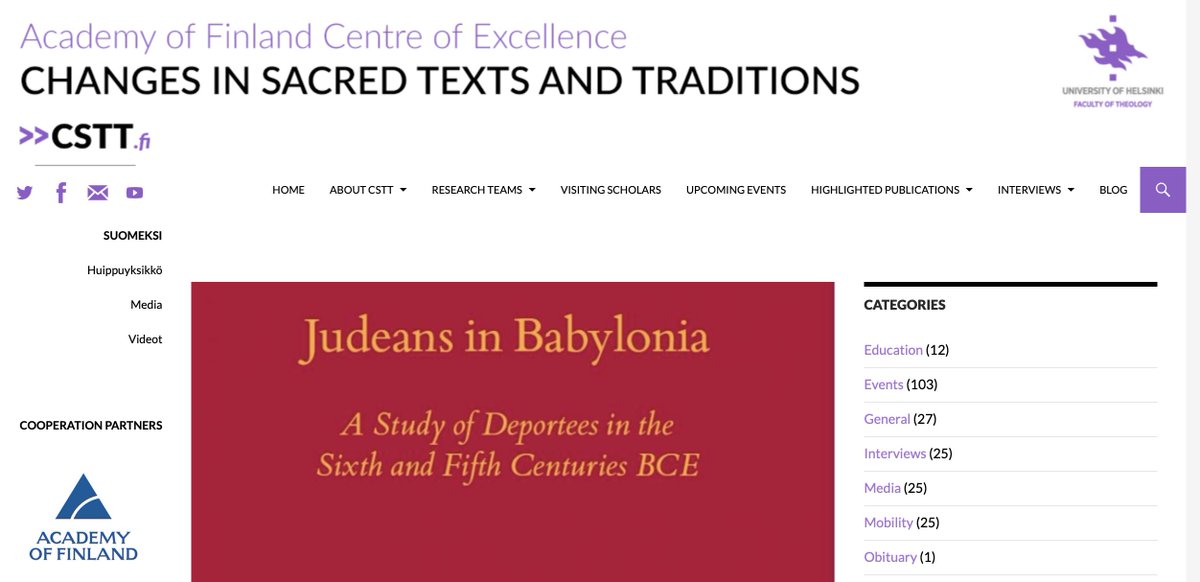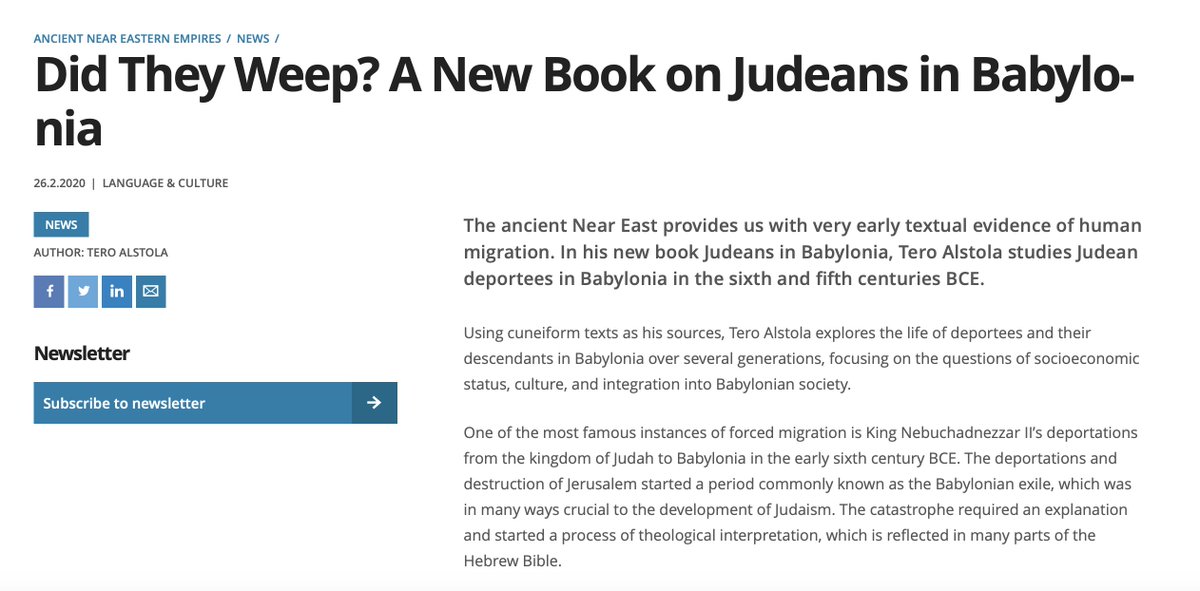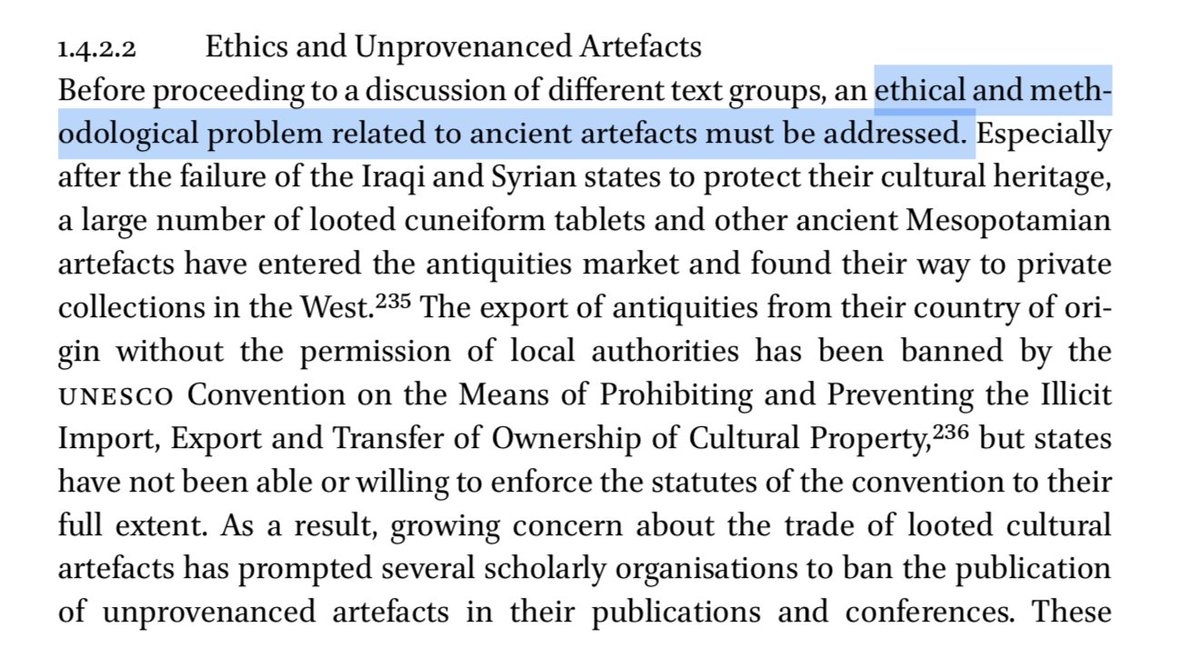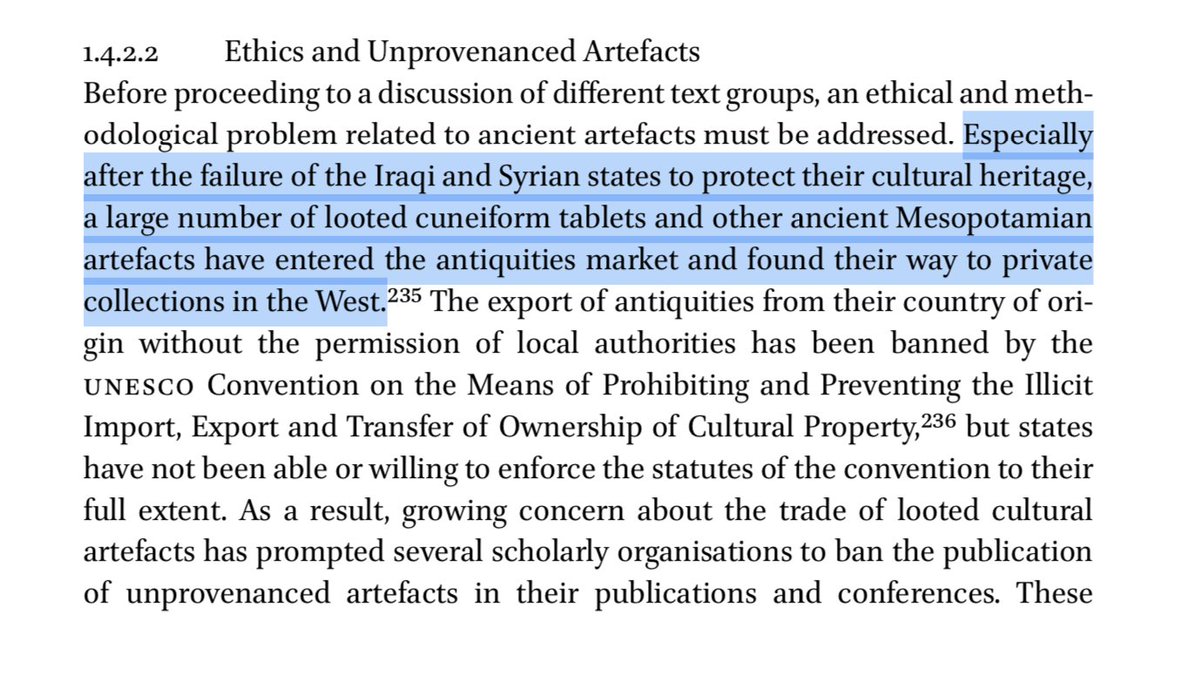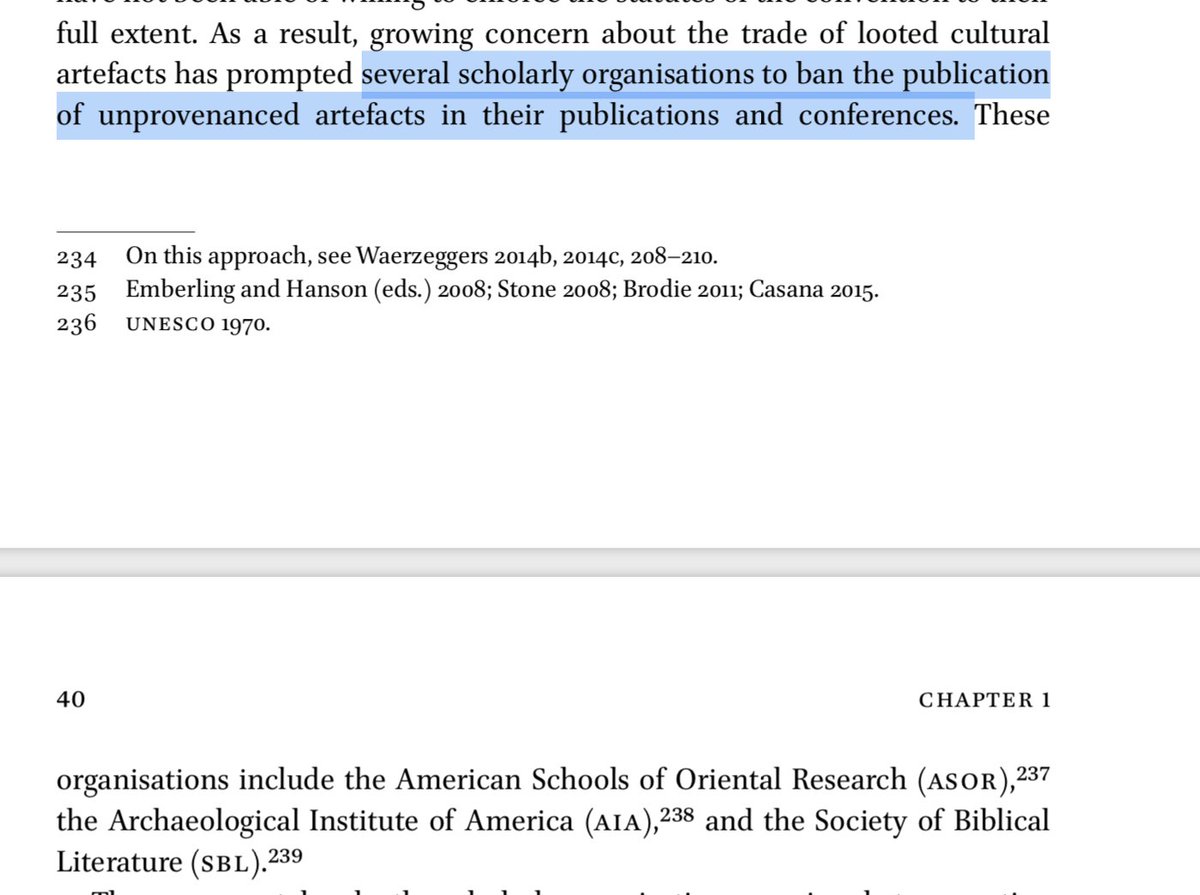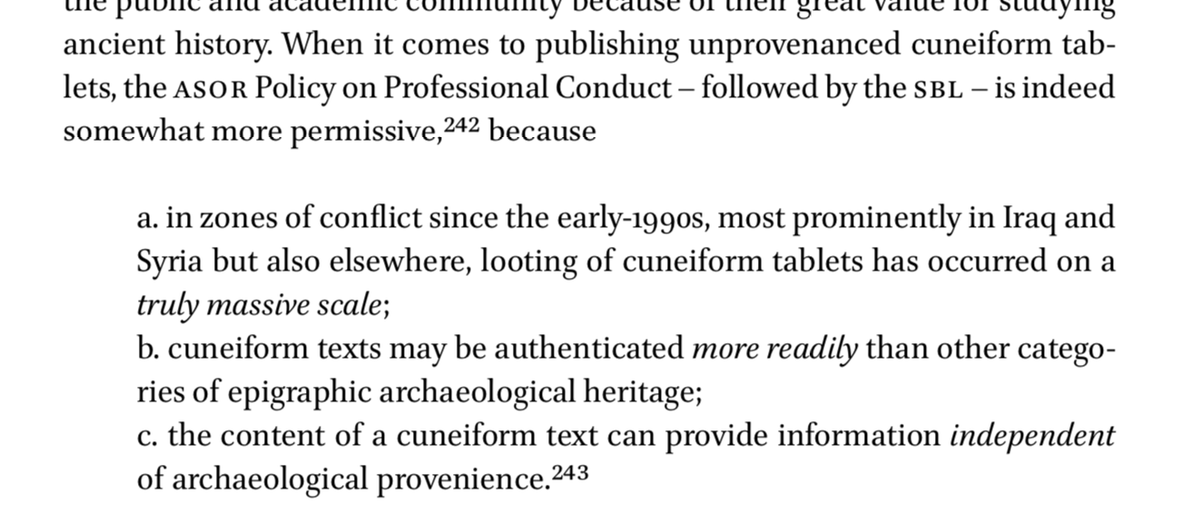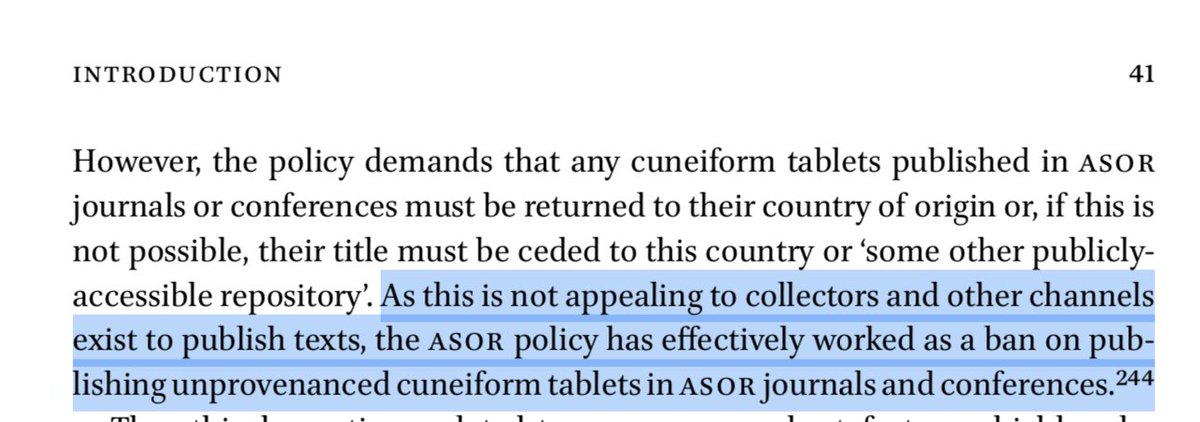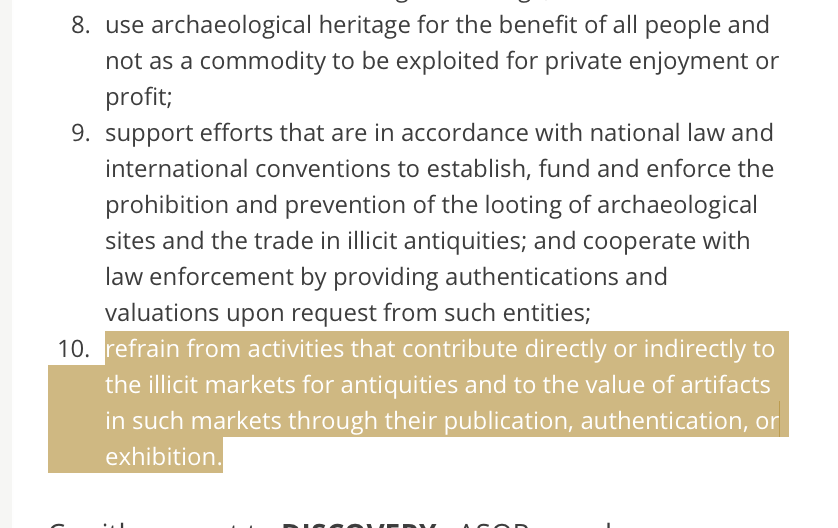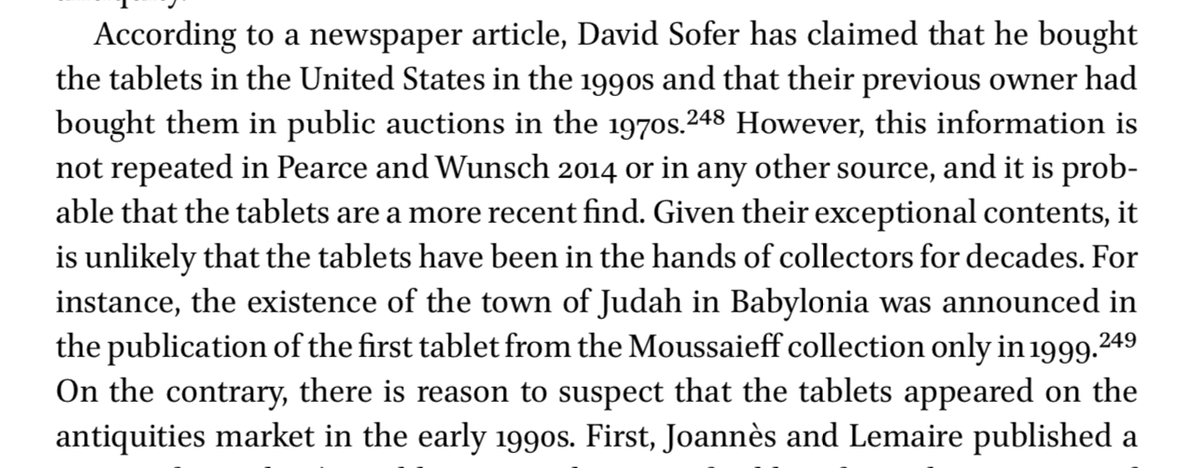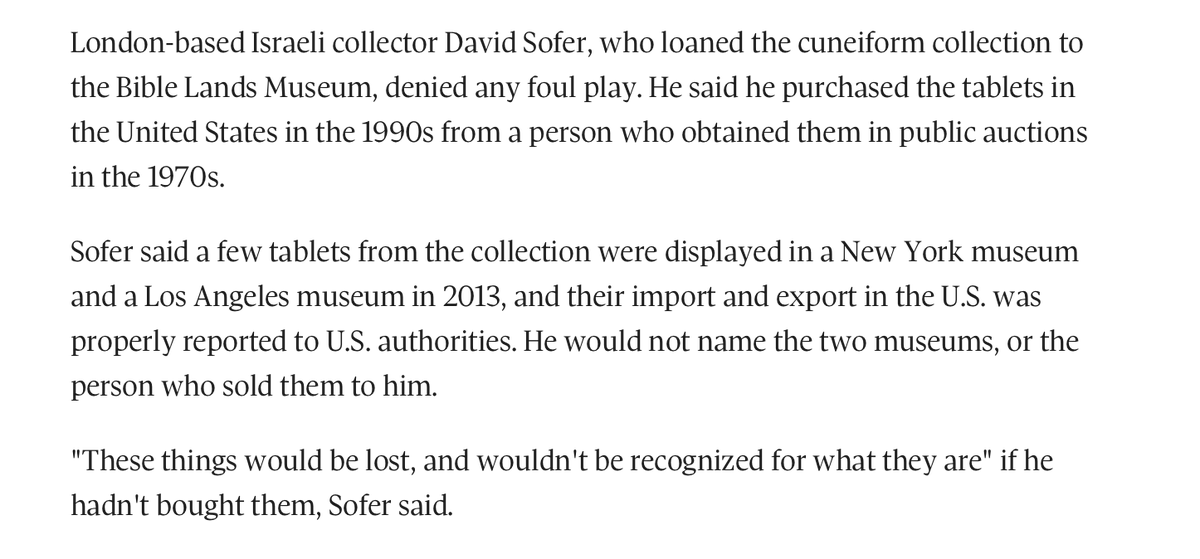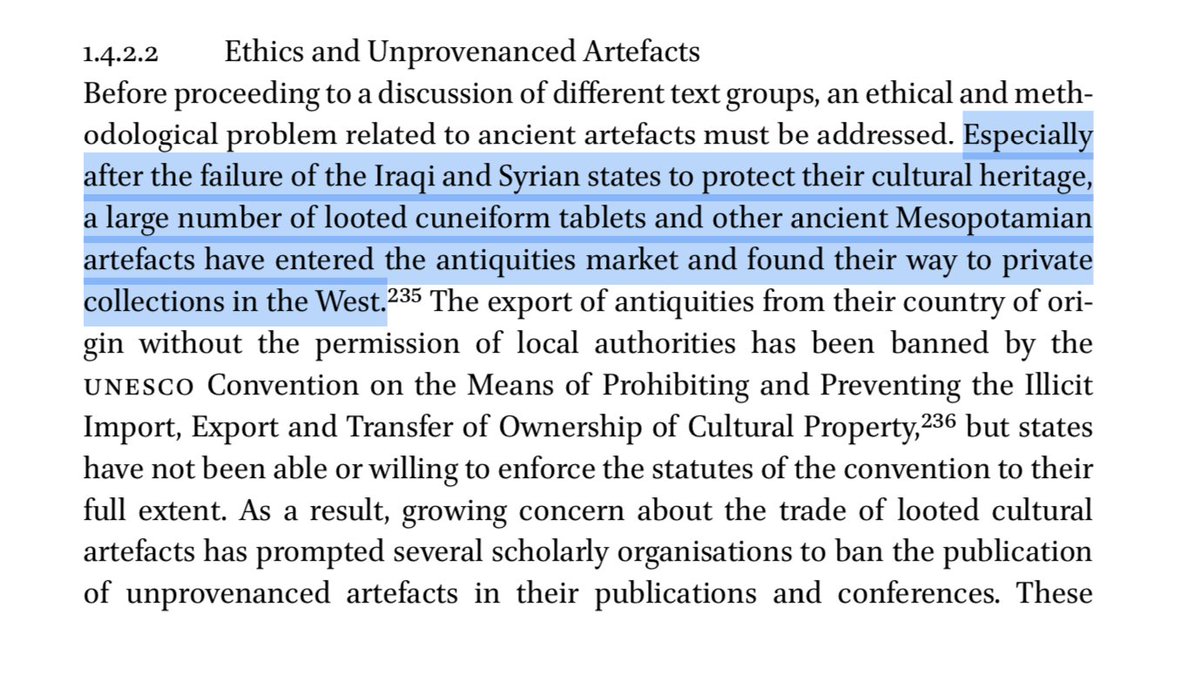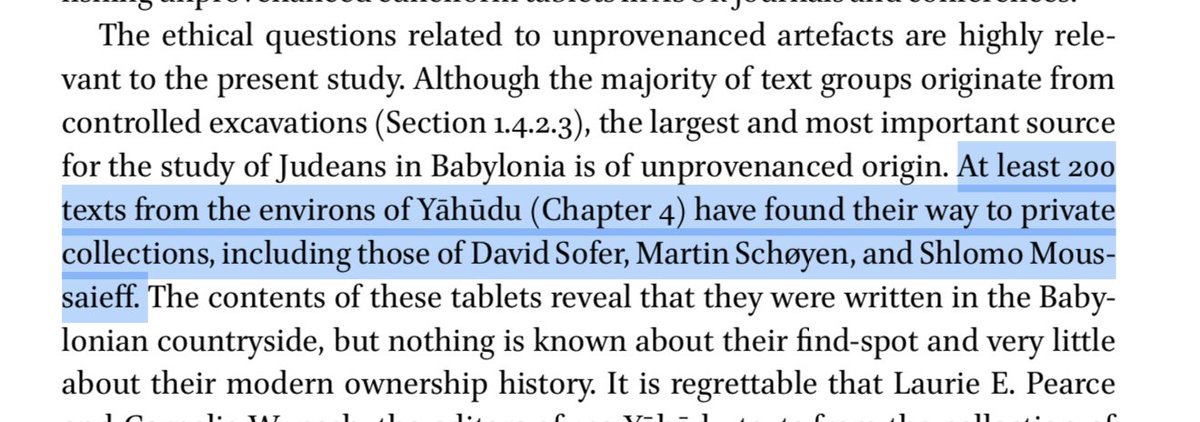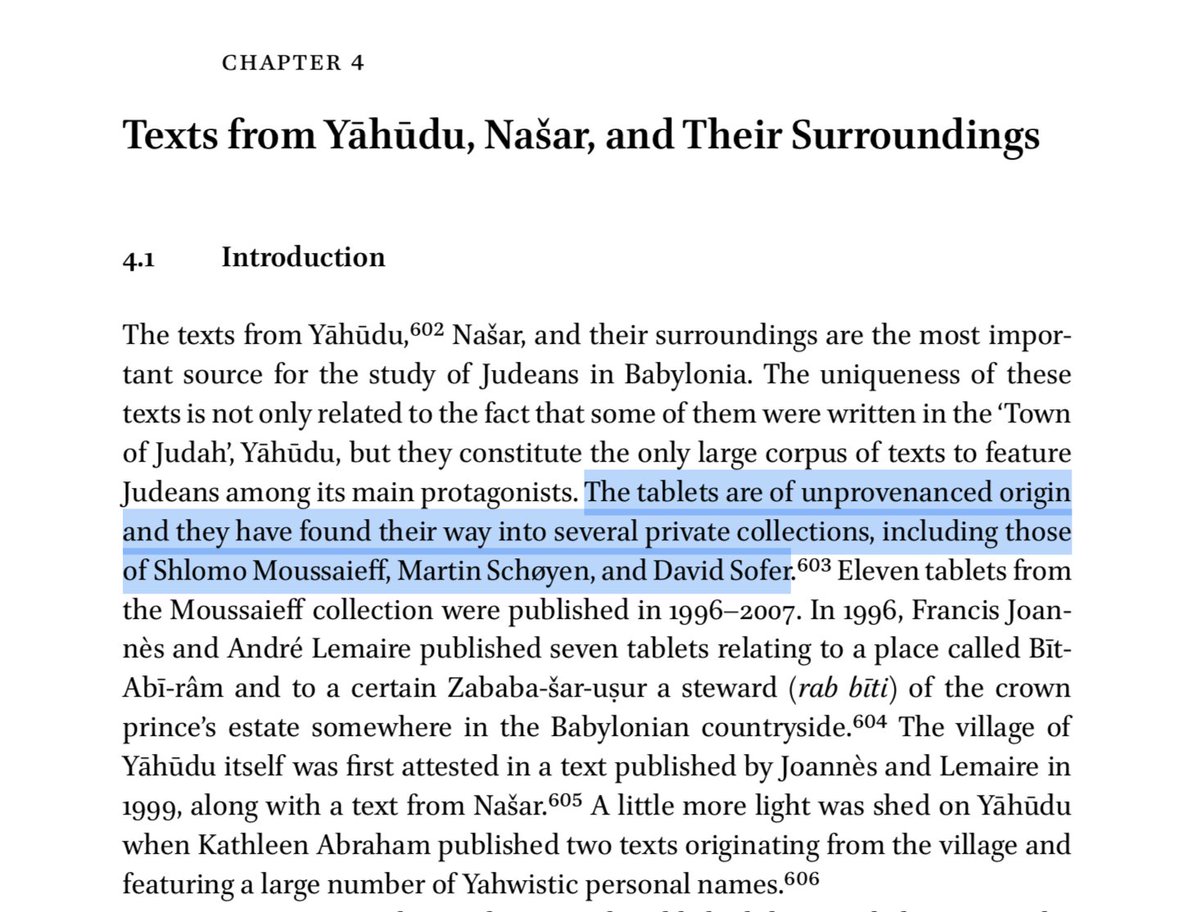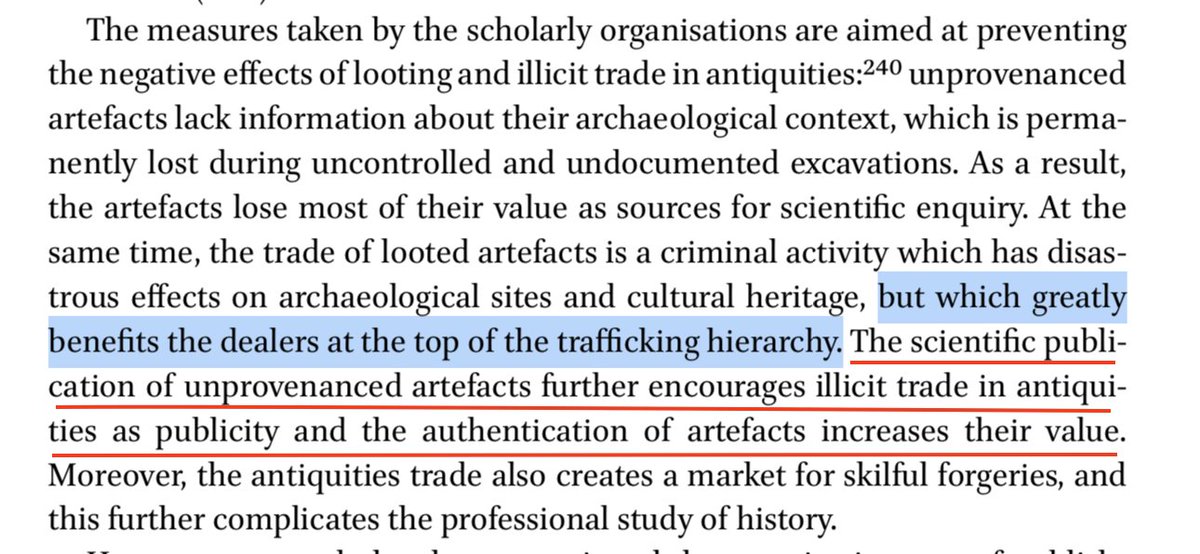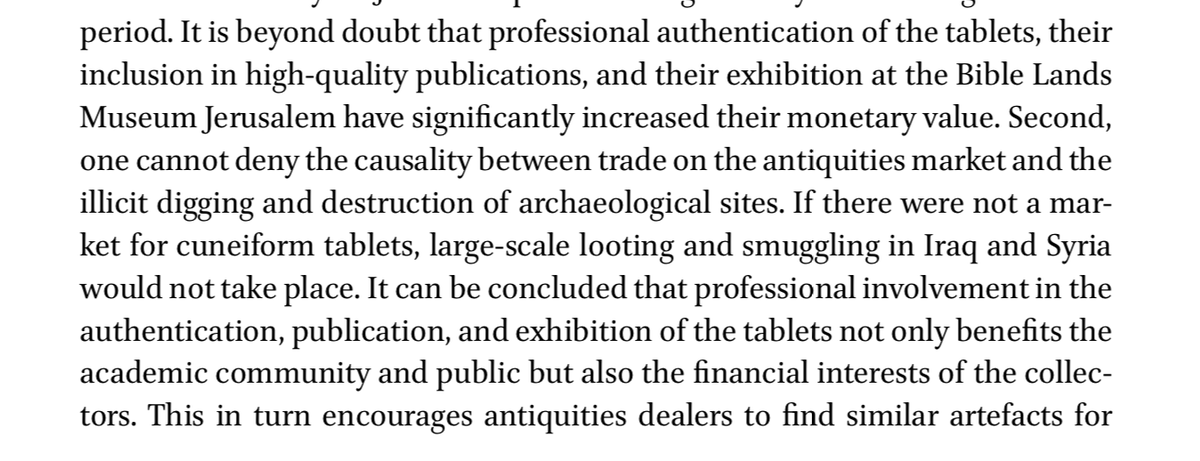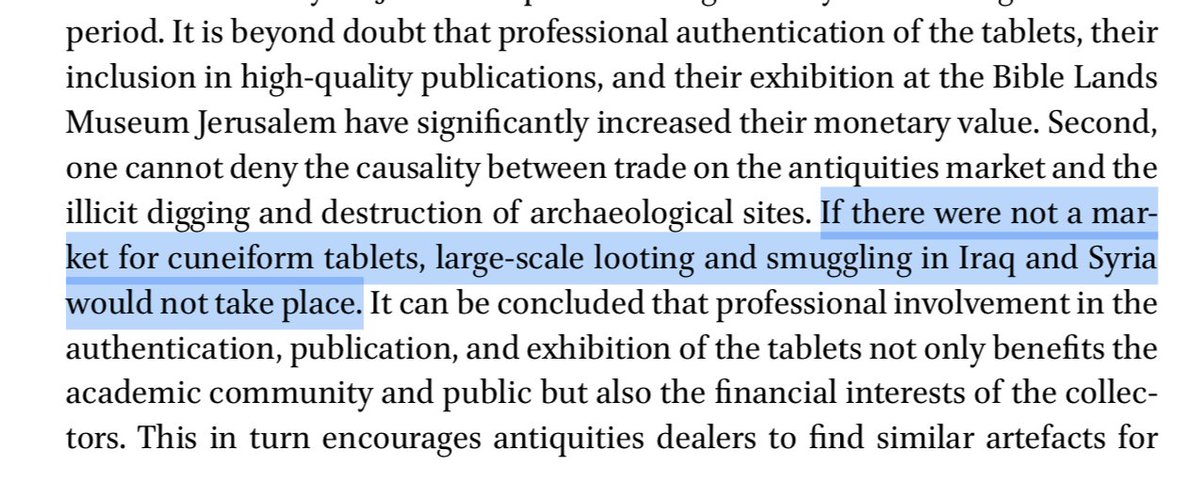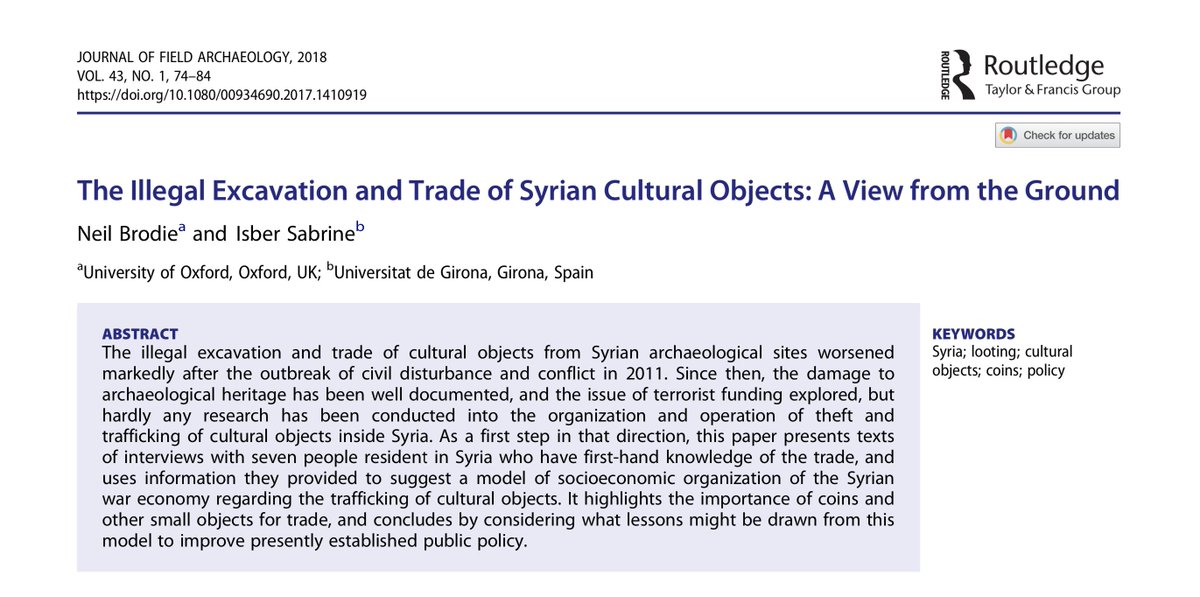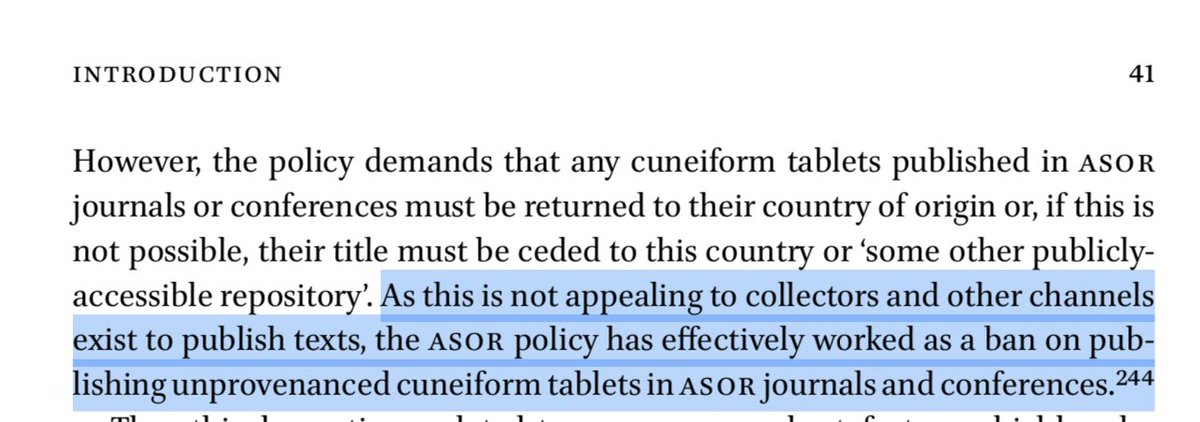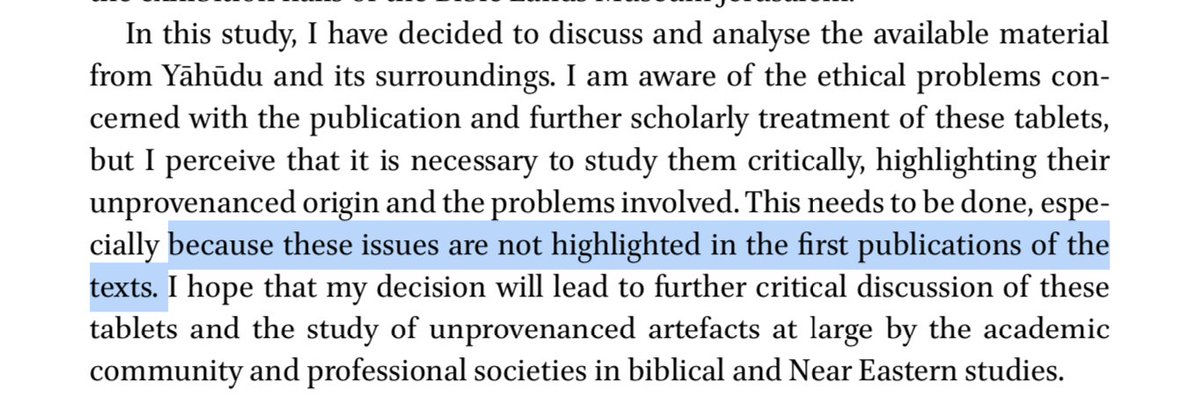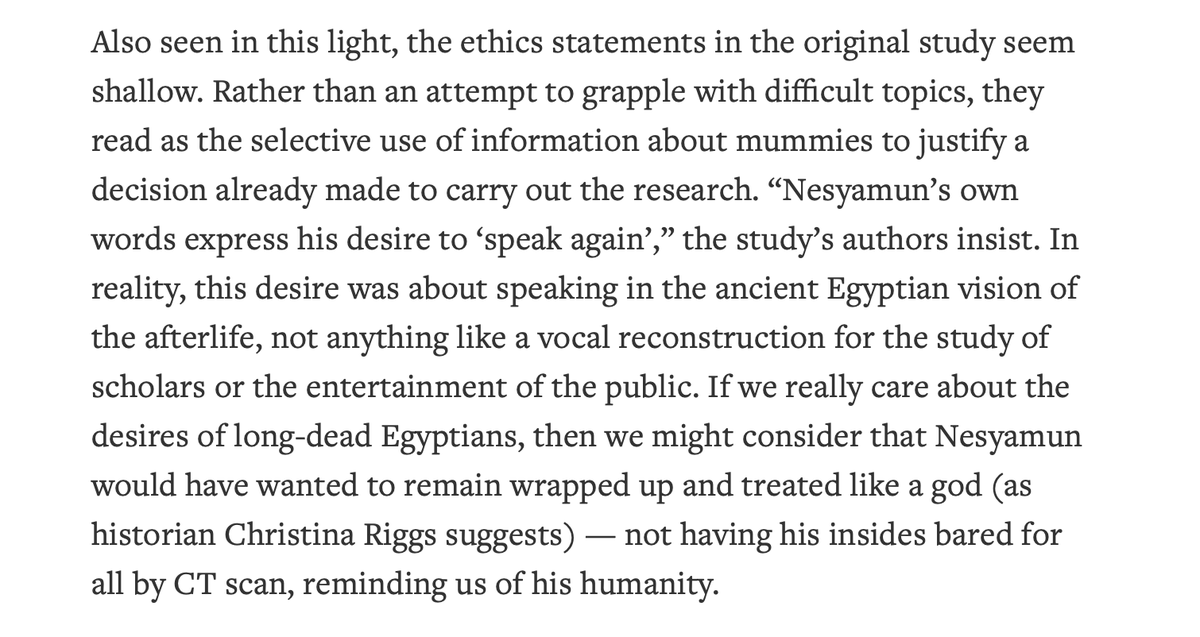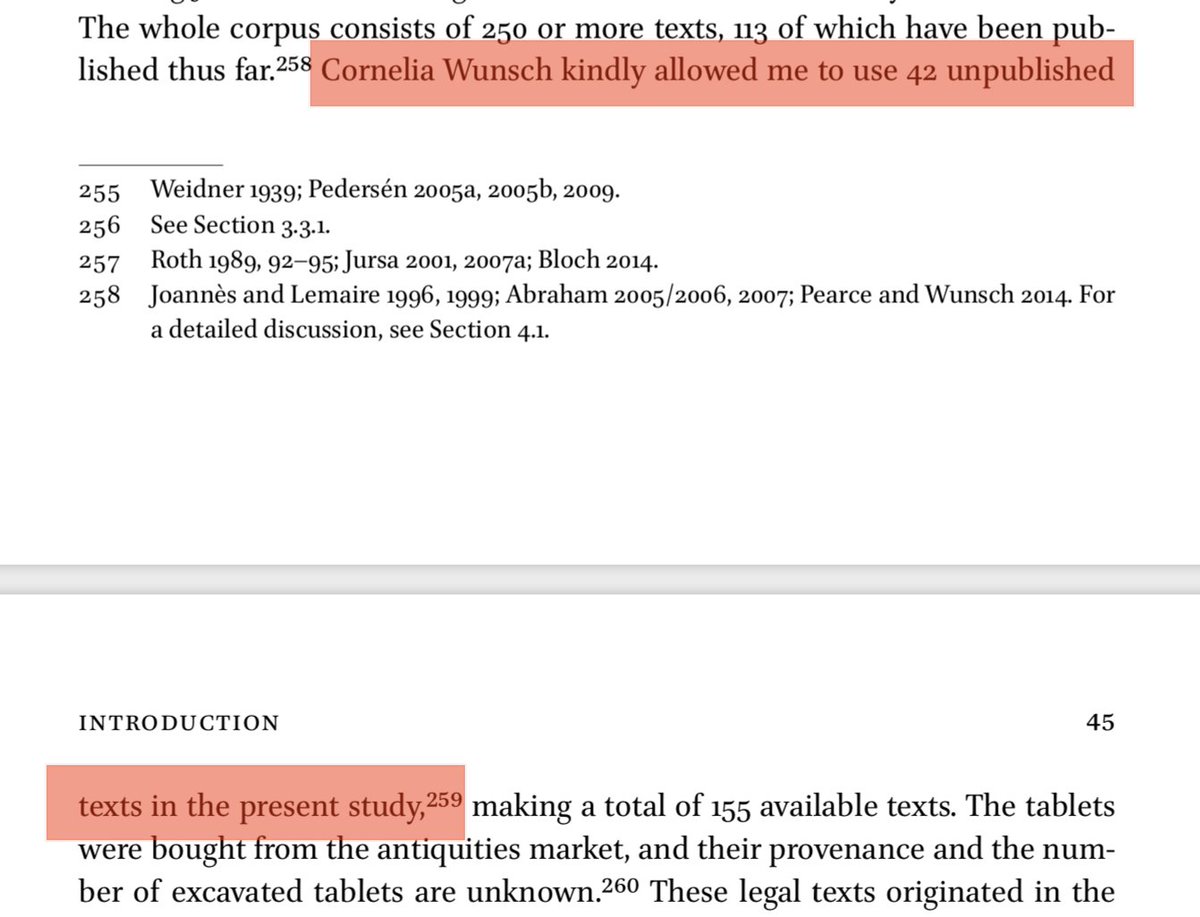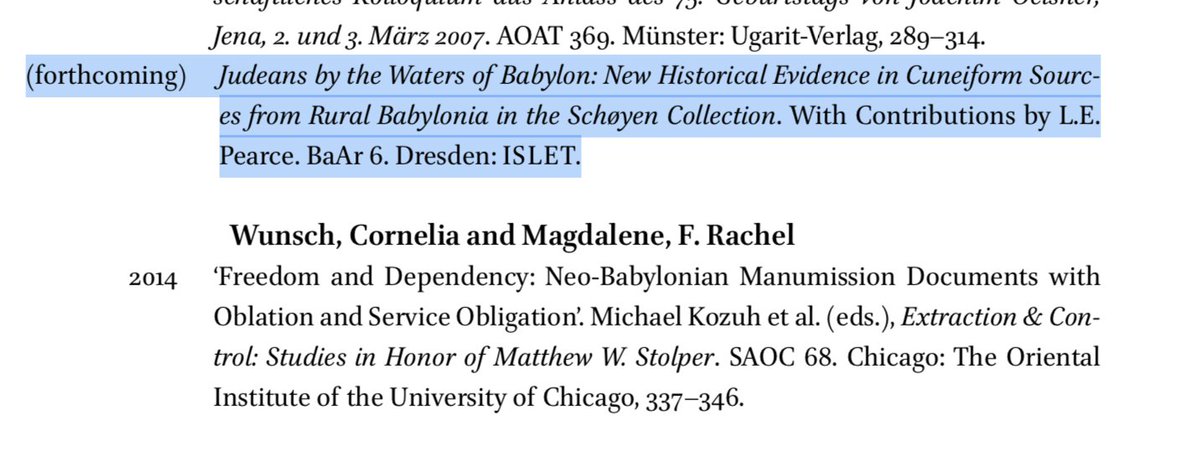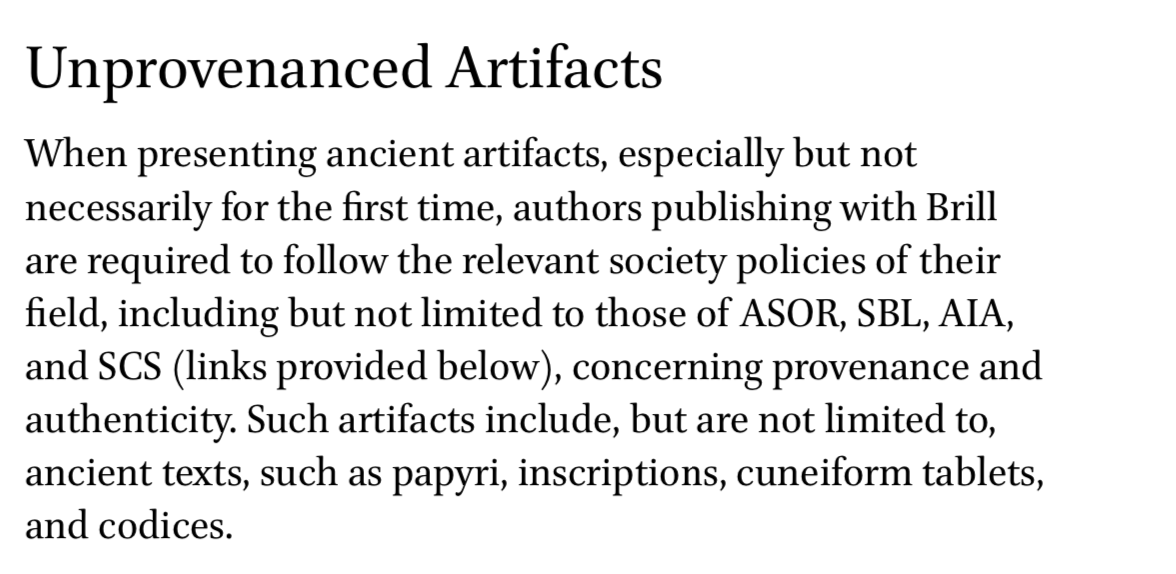University of Helsinki& #39;s ‘Changes in Sacred Texts and Traditions’ celebrates a new book publishing al-Yahudu tablets -- ignoring that they were likely looted & smuggled out of wartime Iraq (in violation of national antiquities laws & a UNSC resolution)
https://blogs.helsinki.fi/sacredtexts/2020/02/01/did-they-weep-a-new-book-on-judeans-in-babylonia/">https://blogs.helsinki.fi/sacredtex...
https://blogs.helsinki.fi/sacredtexts/2020/02/01/did-they-weep-a-new-book-on-judeans-in-babylonia/">https://blogs.helsinki.fi/sacredtex...
Here& #39;s another center of excellence at Helsinki celebrating the book back in February, again w/o mentioning the major ethical and legal issues relating to the provenance of the tablets.
https://www.helsinki.fi/en/news/language-culture/did-they-weep-a-new-book-on-judeans-in-babylonia">https://www.helsinki.fi/en/news/l...
https://www.helsinki.fi/en/news/language-culture/did-they-weep-a-new-book-on-judeans-in-babylonia">https://www.helsinki.fi/en/news/l...
The book is Judeans in Babylonia: A Study of Deportees in the Sixth and Fifth Centuries BCE by Tero Alstola, published in December 2019 by Brill -- which has admirably made the book open-access, so we can look more closely at the treatment of provenance. https://brill.com/view/title/35981">https://brill.com/view/titl...
Judeans in Babylonia has a 4-page section on "Ethics and Unprovenanced Artefacts".
This is important, as publications of Al-Yahudu tablets have typically ignored this issue.
So, what does the ethics section say? . . .
This is important, as publications of Al-Yahudu tablets have typically ignored this issue.
So, what does the ethics section say? . . .
It starts out by emphasizing the need to address lack of provenance as an important ethical and methodological issue -- this is good.
. . . but then immediately appears to blame the Iraqi and Syrian states for failing to protect their cultural heritage!?!
No mention of, among other things, invading armies of various foreign states, or the different non-state militias active in these countries.
No mention of, among other things, invading armies of various foreign states, or the different non-state militias active in these countries.
The author refers to the ethics policies of scholarly organizations, especially ASOR, several times -- in contradictory ways.
Here he says they simply *banned* publication of unprovenanced artifacts, when there is no blanket ban (see below).
Here he says they simply *banned* publication of unprovenanced artifacts, when there is no blanket ban (see below).
A page later Alstola mentions that the ASOR policy (and SBL& #39;s, since it has adopted the ASOR policy) has an *exception* for cuneiform tablets
Though as he notes the conditions of the exception (repatritation of the artfiacts once they are published) mean that the exception has never been used.
But this is still not an outright ban as he states here.
But this is still not an outright ban as he states here.
Finally, at the end of the section he states correctly that it is not a total ban on publishing unprovenanced artifacts, just prohibiting *first publication* -- once they& #39;re published elsewhere these artifacts are fair game for any of these organizations& #39; journals & conferences.
But even this statement is not entirely correct.
It is not really true that these organizations "do not take a stand on subsequent publication"
It is not really true that these organizations "do not take a stand on subsequent publication"
In section III.B.10 of the ASOR policy, for instance, we read that "ASOR members endeavor to...refrain from". publishing, authenticating, and displaying artifacts in "illicit markets".
The language is somewhat vague, and only uses "endeavor" vs requirement, but still noteworthy.
The language is somewhat vague, and only uses "endeavor" vs requirement, but still noteworthy.
So much for the confusing & not-quite-correct discussion of provenance policies.
How is the provenance of the Al-Yahudu tablets themselves discussed?
How is the provenance of the Al-Yahudu tablets themselves discussed?
Alstola notes that one of the collectors of the tablets, David Sofer, once claimed that their collection history can be traced back to the 1970s, but that this claim has not been repeated in any scholarly source and is unreliable.
Sofer& #39;s claim was originally published in a 2015 AP article by @DanielEstrin here:
https://www.theglobeandmail.com/news/world/ancient-tablets-displayed-in-jerusalem-part-of-debate-over-looting-of-antiquities-in-mideast/article22940572/">https://www.theglobeandmail.com/news/worl...
https://www.theglobeandmail.com/news/world/ancient-tablets-displayed-in-jerusalem-part-of-debate-over-looting-of-antiquities-in-mideast/article22940572/">https://www.theglobeandmail.com/news/worl...
Alstola notes several lines of evidence that in fact these tablets emerged more recently than the 1970s -- probably starting in the 1990s.
This would place their removal in the aftermath of the Gulf War, when there was a spike of Iraqi antiquities on the market.
This would place their removal in the aftermath of the Gulf War, when there was a spike of Iraqi antiquities on the market.
As an aside, Alstola refers more than once to "Iraqi Antiquities Authority" (rather than the State Board of Antiquities and Heritage) -- perhaps confused by the Israel Antiquities Authority -- suggesting a lack of familiarity with laws & institutions overseeing the tablets?
But at the same time, Alstola makes the tablets themselves the agents of their own entry to collections outside of Iraq -- note the formulation "found their way to private collections", often used elsewhere to remove responsibility from dealers & collectors.
How does Alstola deal with the problem of unprovenanced antiquities more generally?
He notes there are multiple problems w/lack of provenance -- not just loss of info about context, but it reflects criminal activity that benefits dealers, & publication encourages more looting!
He notes there are multiple problems w/lack of provenance -- not just loss of info about context, but it reflects criminal activity that benefits dealers, & publication encourages more looting!
He emphasizes the role of publication and collecting in driving looting, which is very significant (this connection is often denied by scholars who want to publish unprovenanced artifacts).
But Alstola overreaches when he suggests that the market for cuneiform tablets is the *only* driver of large-scale looting in Syria and Iraq
In fact, many studies -- including recent studies on Syria and Iraq themselves -- suggest that various small finds, especially coins, are the most commonly looted and smuggled items.
For instance, Neil Brodie and Isber Sabrine in 2018, here:
https://traffickingculture.org/publications/brodie-n-and-isber-sabrine-2018-the-illegal-excavation-and-trade-of-syrian-cultural-objects-a-view-from-the-ground-journal-of-field-archaeology-431-74-84/">https://traffickingculture.org/publicati...
For instance, Neil Brodie and Isber Sabrine in 2018, here:
https://traffickingculture.org/publications/brodie-n-and-isber-sabrine-2018-the-illegal-excavation-and-trade-of-syrian-cultural-objects-a-view-from-the-ground-journal-of-field-archaeology-431-74-84/">https://traffickingculture.org/publicati...
After unpacking some of this discussion, let& #39;s move to Alstola& #39;s ethics conclusions.
He criticizes scholars who published editions of Yahudu tablets fo not discussion provenance and ethics.
He criticizes scholars who published editions of Yahudu tablets fo not discussion provenance and ethics.
Alstola ends up going further: he suggests that the tablets should not have been published without following the guidelines of the ASOR cuneiform exception -- that is, repatriating them to Iraq.
In fact, since Alstola already noted that the cuneiform exception is an effective ban on first publication, Alstola is suggesting that the Yahudu tablets should never have been published at all.
So how does this affect Alstola& #39;s own study?
This is where he shifts. He now suggests that, since this is not a first publication of texts, they are free to publish -- especially since the initial publications did *not* discuss the problems of lack of provenance, as he has done.
This is where he shifts. He now suggests that, since this is not a first publication of texts, they are free to publish -- especially since the initial publications did *not* discuss the problems of lack of provenance, as he has done.
What& #39;s wrong with this justification?
First, it ignores the fact that the entire body of publication -- not just first publication -- helps drive up prices for unprovenanced artifacts and encourages looting.
Here, let Sotheby& #39;s make it clear for you: https://twitter.com/MichaelDPress/status/1084125281969950721">https://twitter.com/MichaelDP...
First, it ignores the fact that the entire body of publication -- not just first publication -- helps drive up prices for unprovenanced artifacts and encourages looting.
Here, let Sotheby& #39;s make it clear for you: https://twitter.com/MichaelDPress/status/1084125281969950721">https://twitter.com/MichaelDP...
Beyond this, the shift makes the entire ethics discussion seems like a retroactive justification for a decision *already made* to study the tablets.
Like a cheap stunt.
Like a cheap stunt.
Unfortunately, we see this a lot in when scholars address ethics in their work on studying ancient artifacts (and human remains).
Here with the "mummy& #39;s voice" study -- is this really an honest attempt to grapple with the issues?
https://hyperallergic.com/539573/attempts-to-reconstruct-a-mummys-voice-are-cursed/">https://hyperallergic.com/539573/at...
Here with the "mummy& #39;s voice" study -- is this really an honest attempt to grapple with the issues?
https://hyperallergic.com/539573/attempts-to-reconstruct-a-mummys-voice-are-cursed/">https://hyperallergic.com/539573/at...
Amazingly, it gets worse!
The *very next page* after justifying his study based on the fact that it& #39;s not an initial publication . . . Alstola describes his corpus and notes that it includes 42 previously unpublished texts!
The *very next page* after justifying his study based on the fact that it& #39;s not an initial publication . . . Alstola describes his corpus and notes that it includes 42 previously unpublished texts!
Alstola is thanking Cornelia Wunsch for letting him publish 42 texts for the first time, texts that she will eventually publish as part of her works on tablets from the Schøyen collection!
In other words, Alstola& #39;s ethics discussion isn& #39;t just a cheap stunt. It& #39;s breathtakingly dishonest.
Remember, Alstola himself suggests that the Yahudu tablets should never have been published w/o repatriation -- & then proceeds to publish some new ones! https://twitter.com/MichaelDPress/status/1245402798931546112">https://twitter.com/MichaelDP...
Remember, Alstola himself suggests that the Yahudu tablets should never have been published w/o repatriation -- & then proceeds to publish some new ones! https://twitter.com/MichaelDPress/status/1245402798931546112">https://twitter.com/MichaelDP...
It& #39;s also worth noting that -- the very next month after the publication of this book -- the publisher, Brill, adopted new provenance guidelines that *would never have allowed Alstola& #39;s book to be published*, at least in its present form.
https://brill.com/fileasset/downloads_static/static_publishingbooks_publicationethics.pdf">https://brill.com/fileasset...
https://brill.com/fileasset/downloads_static/static_publishingbooks_publicationethics.pdf">https://brill.com/fileasset...
My conclusion: Assyriology and other fields that study the past will continue in their failure to address the ethics of working w/ unprovenanced material, because so many scholars in these fields do not take ethics discussions remotely seriously.

 Read on Twitter
Read on Twitter